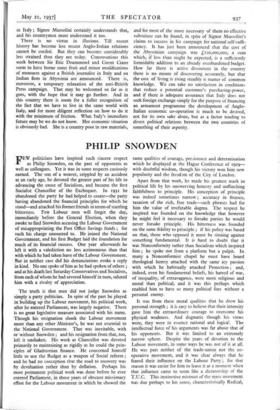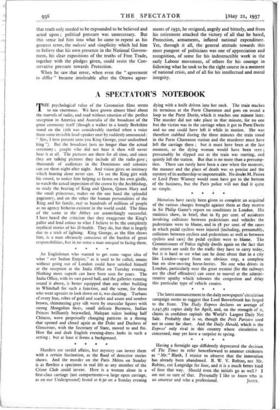PHILIP SNOWDEN
FEW politicians have inspired such sincere respect as Philip Snowden, on the part of opponents as well as colleagues. Yet it was in some respects curiously earned. The son of a weaver, crippled by an accident at an early age, he devoted the greater part of his life to advancing the cause of Socialism, and became the first Socialist Chancellor of the Exchequer. In 1931 he abandoned the party he had helped to create—the party having abandoned the financial principles for which he stood—and attacked his former friends in terms of startling bitterness. Few Labour men will forget the day, immediately before the General Election, when they awoke to find Snowden accusing the Labour Government of misappropriating the Post Office Savings funds ; for such his charge amounted to. He joined the National Government, and his first Budget laid the foundation for much of its financial success. One year afterwards he left it with a valediction no less acrimonious than that with which he had taken leave of the Labour Government. But in neither case did his denunciations evoke a reply in kind. No one spoke of him as he had spoken of others ; and at his death last Saturday Conservatives and Socialists, from each of whom he had severed himself in turn, saluted him with a rivalry of appreciation.
The truth is that men did not judge Snowden as simply a party politician. In spite of the part he played in building up the Labour movement, his political work, after he entered Parliament, was largely negative. There is no great legislative measure associated with his name. Though his resignation shook the Labour movement more than any other Minister's, he was not essential to the National Government. That was inevitable, with or without Snowden ; and his resignation from that, too, left it unshaken. His work as Chancellor was devoted primarily to maintaining as rigidly as he could the prin- ciples of Gladstonian finance. He concerned himself little to use the Budget as a weapon of Social reform ; and he had no conception that the road to recovery was by devaluation rather than by deflation. Perhaps his most permanent political work was done before he ever entered Parliament, in those years of obscure missionary effort for the Labour movement in which he showed the same qualities of courage, per iistence and determination which he displayed at the Hague Conference of r929— with doubtful wisdom, though his victory won him new popularity and the freedom of the City of London.
Apart from that work, he made his greatest mark in political life by his unswerving honesty and unflinching faithfulness to principle. His conception of principle was indeed sometimes narrow ; accuracy in finance, taxation of the rich, free trade—such phrases had for him the value of irrefutable dogma. The respect he inspired was founded on the knowledge that however he might feel it necessary to forsake parties he would never forsake principle. His bitterness was founded on the same fidelity to principle ; if his policy was based on that, those who opposed it must be sinning against something fundamental. It is hard to doubt that it was Nonconformity rather than Socialism which inspired him ; he spoke not from a platform but a pulpit. In many a Nonconformist chapel he must have heard theological heresy attacked with the same icy passion with which he habitually attacked Protection ; and, indeed, even his fundamental beliefs, his hatred of war, of inequality, of extravagance, were more religious and moral than political, and it was this perhaps which enabled him to have so many political foes without a personal enemy.
It was from these moral qualities that he drew his personal strength ; it is easy to believe that their intensity gave him the extraordinary courage to overcome his physical weakness. And dogmatic though his views were, they were in essence rational and logical. The intellectual force of his arguments was far above that of his opponents. But it was limited to an extremely narrow sphere. Despite the years of devotion to the Labour movement, in some ways he was not of it at all. He was part neither of the trade-union nor the co- operative movement, and it was clear always that he feared their influence on the Labour Party ; for that reason it was easier for him to leave it at a moment when that influence came to seem like a dictatorship of the T.U.C. This instinctive mistrust of the mass movement was due perhaps to his sense, characteristically Radical, that truth only needed to be expounded to be believed and acted upon ; political pressure was unnecessary. But this sense led him into what he came to repent as his greatest error, the naïveté and simplicity which led him to believe that his own presence in the National Govern- ment, his clear expositions of the truths of Free Trade, together with the pledges given, could resist the Con- servative pressure towards Protection.
When he saw that error, when even the " agreement to differ " became intolerable after the Ottawa agree- ments of 1932, he resigned, angrily and bitterly, and from his retirement attacked the victory of all that he hated, Protection, armaments, inflated national expenditure. Yet, through it all, the general attitude towards this most pungent of politicians was one of appreciation and recognition, of some for his indestructible work in the early Labour movement, of others for his courage in following what he took to be the right course in a moment of national crisis, and of all for his intellectual and moral integrity.















































 Previous page
Previous page